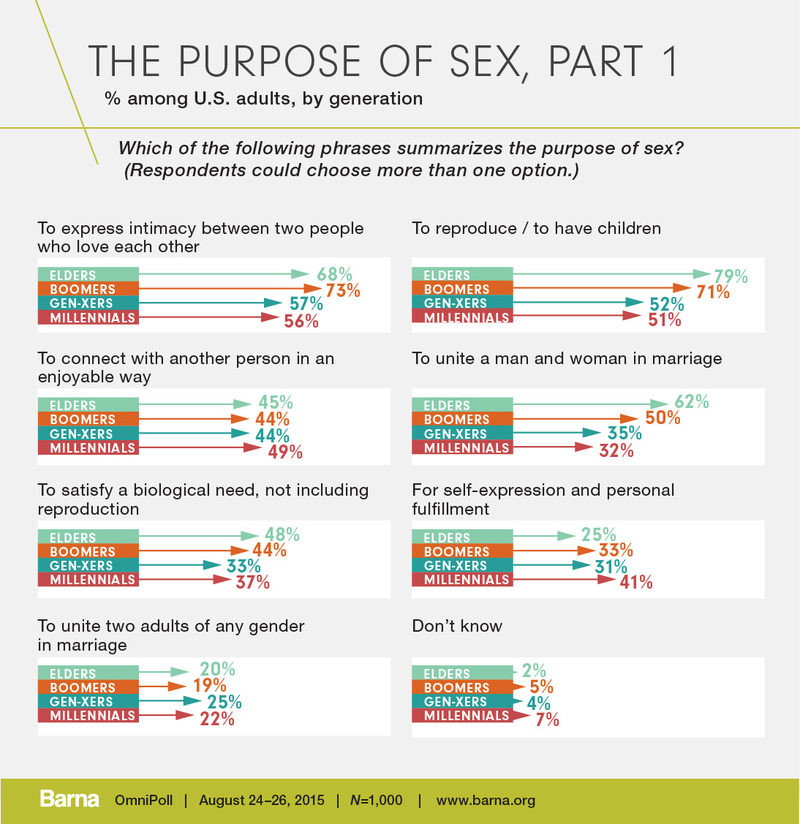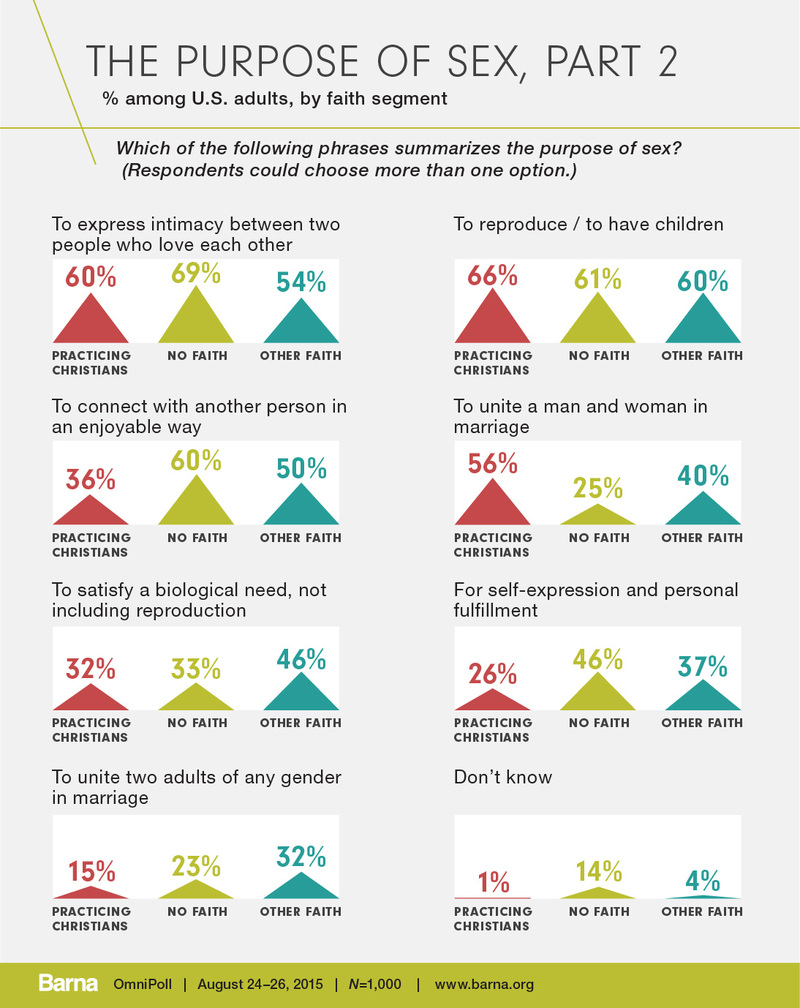By Jeff Brumley
Church isn’t the only institution Millennials are avoiding or abandoning in droves, new research by The Barna Group has found.
The institution of marriage is increasingly shunned by younger Americans who in turn view sexuality as unconnected to matrimony, Barna found in “What Americans Believe About Sex,” a survey released Jan. 14.
The research explores generational attitudes about sex and marriage and, its authors concede, leaves families and churches with some pretty tough challenges in addressing cultural trends on sexuality, marriage and faith.
The findings shouldn’t surprise anyone familiar with other ongoing trends in American society and religion, most notably the rise of the “nones,” said Roxanne Stone, editor-in-chief at Barna.

Those are Americans, especially younger generations, who claim no religious affiliation. Stone said they are in general averse to loyalty to any kind of institution, whether it’s the church or government.
“We have seen in general younger generations moving away from institutions,” Stone told Baptist News Global.
“They are generally less likely to claim any of those larger institutions as part of their identity.”
And marriage is one of those institutions, she added.
“It’s part of a growing sense of individualism and isolation — a sense that you do life on your own,” Stone said.
Generational breakdown
The Barna study shows a clear breakdown between generations on attitudes toward sex, marriage and faith.
Older generations — 79 percent of Elders and 71 percent of Boomers — say sex is for procreation. The belief that sexuality functions to express intimacy between two people who love each other is held by 68 percent of Elders and 73 percent of Boomers.
“The two younger adult generations are much less likely to embrace these traditional views of sex,” the Barna report stated.

The study found that 57 percent of Gen-Xers and 56 percent of Millennials believe sex is for people who love each other. Some 52 percent of the former and 51 percent of the latter believe sex is for procreation.
Only a third of either generation say sex should bond a man and a woman in marriage.
“Nearly half of younger generations say that sex is to connect with another person in an enjoyable way,” Barna said — 44 percent for Gen-Xers and 49 percent of Millennials.
However, faith plays a role in these attitudes, according to the study which found that practicing Christians are twice as likely as those of no faith to say sex is meant to unite a man and woman in marriage.
‘With no reservations’
But even that is changing, said Joe Beam, an internationally acclaimed inspirational speaker, best-selling author and founder of Marriage Helper, Inc.
Beam told BNG that he routinely comes across Christian adults who share the sexuality values expressed in the Barna poll.
Beam said he regularly meets with groups of college-age adults and he teaches a course on sexuality at a Christian college. He finds their attitudes about sex revealing.
“They have the idea that sex is a way to get some relief, some sexual fulfilment, and if you like the person you can have some kind of sex with them,” he said. “Many of them have had sex with more than one partner.”
Many define sex only as intercourse, which itself is viewed as a bonding activity, Beam said.
As a result, he added, sex is viewed by many young people as a stress-relieving, feel-good activity that is not limited to marriage.
Many students tell him they’ve had sex already with multiple partners.

“And these are Christians,” Beam added.
And those attitudes are not limited to young Christians or young people in general. Beam said he regularly speaks at “Bible-based” churches where such views of sex are prevalent.
During a recent visit to a Bible-belt church, Beam said a group of adult women told him it’s OK to sleep with a man on the third date.
They told him that, he said, “with no reservations.”
Likewise, older adult men expressed their belief that using pornography, both alone and during sex, is “OK and healthy.”
‘All mixed together’
No one cultural development can be cited for the current state of sexual attitudes, Beam said.
He agreed with Stone that the rise of the “nones” has an influence.
High divorce rates certainly have an effect on attitudes about sex. But a prevailing opinion that sex should always be exotic also contributes to divorce rates.

“So if I’m not sexually fulfilled with you I will find someone I am fulfilled with,” Beam said.
Entertainment also plays a part as television shows, films and music have long depicted sex as legitimate outside of marriage and procreation, according to Beam.
“It’s all mixed together,” he said about social, religious and media trends that have influenced shifting attitudes about sex.
“It’s a big ball of spaghetti and all of these things are affected by the other.”
What churches can do
For starters, any helpful teaching on the topic of sex and marriage must be unapologetically Christian without resorting to simply citing chapter and verse, Beam said.
“Think about the relationship involved and teach that sex is best in a committed, permanent relationship,” he said, adding younger people should be told that sex is good and that it is best when practiced the way God intended it to be.
Couples should be provided with resources that can help resolve disagreements about sex and can help them overcome periods of sexual inactivity or boredom.
“I teach them about the emotional bonding that takes place” during sex and that it’s “not just about pleasure but about a relationship,” he said.
“Physically and emotionally it should be pleasant and bonding.”
But the education also has to happen with church leadership, Stone said.
“There needs to be less of an assumption that your congregation is married or moving toward marriage,” she said.
Convincing young adults and divorcees to pursue a celibate lifestyle outside of marriage — if that is the approach a church wants to pursue — requires theologically grounded reasoning.
“They are not going to settle for an easy answer on why they are supposed to wait for marriage for sex,” Stone said.
